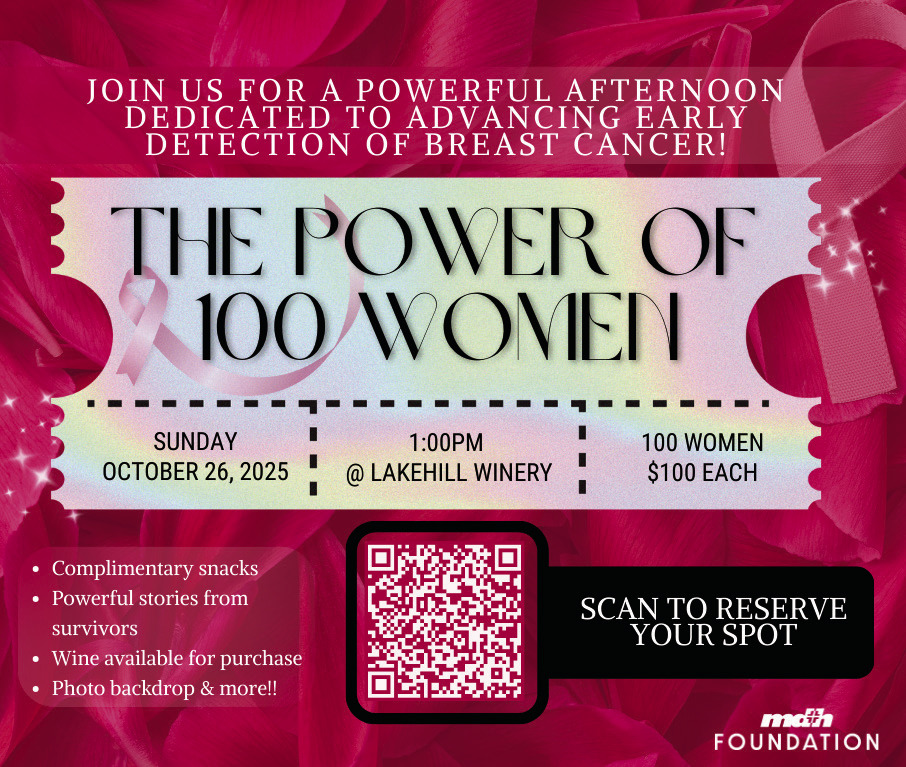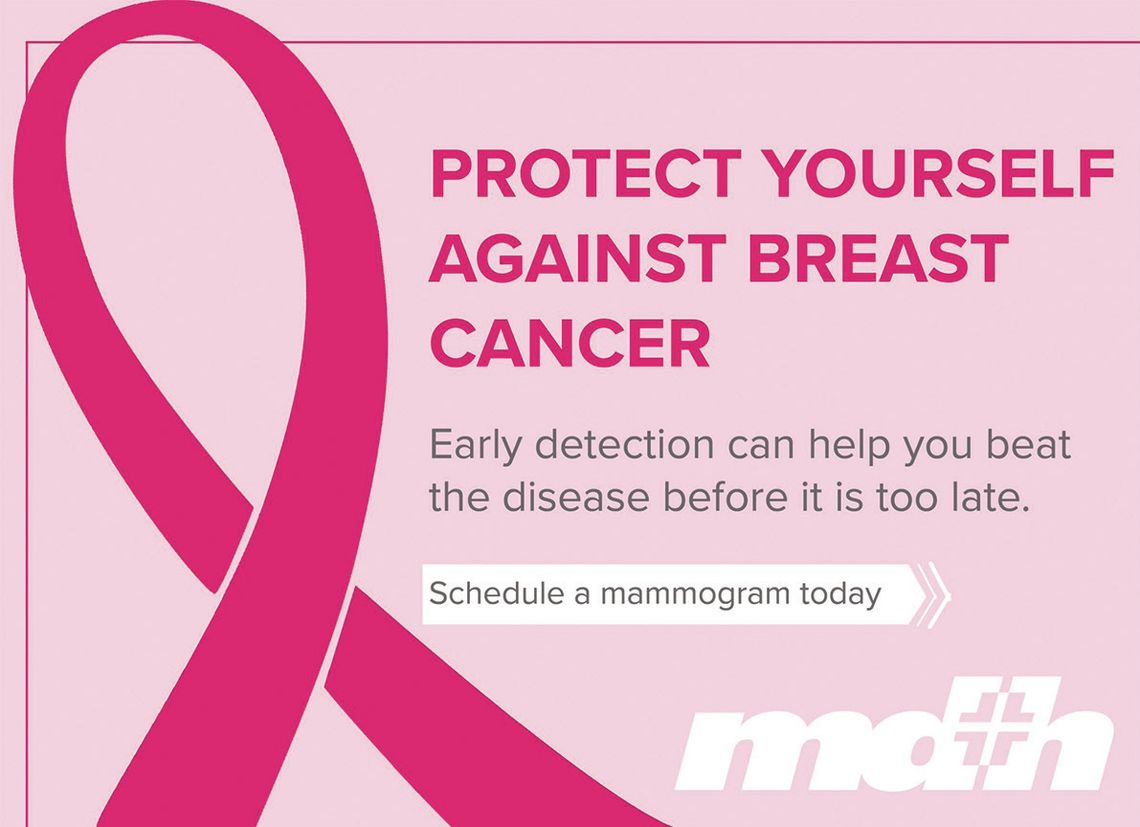Breast Cancer Awareness Month: MDH Provides Screening, Treatment & Hope
One in eight women in the United States will be diagnosed with breast cancer, and one in 43 will die from the disease, according to the American Cancer Society (ACS). Along with organizations like the ACS that provide vital information on screening, treatment and recovery, McDonough County’s community hospital offers a range of services, with a heaping side of hope, to those undergoing treatment for breast cancer.
Screening & Treatment McDonough District Hospital (MDH) provides 3D mammography screenings, which can provide early detection of breast cancer. Mammograms are also used to diagnose cysts and other abnormalities. The hospital opened the Dolores Kator Switzer Women’s Center in 2020, which includes MDH’s updated imaging center that provides diagnostic imaging, breast biopsies and ultrasounds, among other services.
“Mammograms play a significant role in the early detection of breast cancer because they can detect changes in the breast that may be early signs of cancer, but are too small or subtle to be felt,” noted WHO.
“The use of 3D mammography has greatly enhanced the ability to detect breast cancer at the earliest stages.”
According to MDH Chief Nursing Officer Wayne Laramie, who also is a member of MDH’s Cancer Tumor Board, studies have proven that 3D mammograms find more cancers than traditional 2D mammograms and also reduce the number of false positives. The 3D mammography offers more accurate detection, earlier diagnosis, better detection in dense breast tissue, less anxiety by reducing false positives and is safer and more effective for detecting breast cancer earlier.
A referral isn’t needed to schedule a mammogram if a person is over 40. Those younger than 40 who are experiencing issues should contact their primary care provider to discuss getting a mammogram.
“What separates us is our professional mammographers. They are experienced, caring, compassionate and personable with over 25 years of experience. They always take the time to explain the exam with the patient, listen to the patient’s health history, answer questions or concerns, educate the patient regarding breast health and ease a patient’s anxieties,” Laramie added.
He explained that MDH’s approach to breast cancer treatment involves a multidisciplinary team, composed of surgeons, oncologists and radiation oncologists, to provide care for various stages of breast cancer, including early and locally advanced cancers, using treatments like surgery, chemotherapy, radiation therapy and hormonal and biological therapies. Treatment decisions, such as whether to use systemic therapies like chemotherapy or hormonal therapy, are made based on the specific type and characteristics of the cancer. Treatments focus on local control, such as surgery and radiation, and systemic treatment, which affects the entire body.
“We focus on the patient.
Treatment is designed to maintain quality of life and managing side effects,” Laramie stressed.
Linda’s Fund: Peace of Mind Since October 2008, over $432,000 has been raised for a local philanthropic organization that provides necessities to breast cancer survivors. Brad Bainter, who was born and raised in Sciota, and his wife, Amy, started “Linda’s Fund” at McDonough District Hospital in honor of Bainter’s mother, Linda (Ren) Bainter, who passed away after her second battle with breast cancer on April 11, 1996 at the age of 57. That day was also Brad’s 39th birthday.
Along with her son, Linda left behind her husband and Brad’s younger sister, Penny.
“I think my mom’s two greatest disappointments, when she found out she was not going to win this battle a second time, were she was not going to get the opportunity to watch her grandchildren grow up and she felt as though she was letting down other breast cancer survivors whom she had been encouraging for many years,” Bainter said. “I can’t change that she did not have the opportunity to watch her grandkids grow up, but through this fund in her memory, we can continue her work of encouraging other women with breast cancer, and our family can honor the courageous battle she waged against breast cancer for 14 years.”
“Linda’s Fund” was established by Brad and Amy through the MDH Foundation to support women and their families fighting breast cancer. Typically, this support includes direct financial assistance to pay medical bills not covered by insurance; special adaptive clothing; personal care items; gas money and the like.
“We are so grateful to work alongside Brad and Amy and have a fund available in our community that provides financial support for those battling breast cancer. With all of the other stressors that come with a breast cancer diagnoses, Linda’s Fund aims to alleviate some of that financial burden. I am proud to help raise awareness of the fund and do our part to reach those in need,” said Brittany Moore, director of the MDH Foundation. “Some of our past recipients have been such positive advocates for early detection and listening to your body. Our local community is filled with warriors who I feel lucky to know.”
Recipients must receive healthcare services from MDH, which includes all of McDonough County and portions of Adams, Fulton, Hancock, Henderson, Schuyler and Warren counties. Awards range from $500 up to $1,500, and applicants may reapply after three months. Applications are available at mdh. org, or by calling the MDH Foundation office at (309) 836-1757. Donations may also be made by contacting the MDH Foundation or making a gift online at mdh. org/get-involved/make-agift.
Mammography Assistance Program (M.A.P.)
McDonough District Hospital also provides the Mammography Assistance Program (M.A.P.) for individuals seeking financial assistance for breast screening. M.A.P. provides 100 percent funding to receive this life-saving exam. If an individual does not have health insurance and are 40-64 years of age, they are eligible for the Illinois Breast and Cervical Cancer Program (IBCCP) and/or Susan G. Komen funding, which are both administered through the local McDonough County Health Department (MCHD). To apply, call Patient Financial Services at (309) 8361528 or (309) 836-1529.
MDH eligibility guidelines are based on family size and income.
Breast Cancer Support Group: Providing Hope One Meeting at a Time Started by Ashley Buchen and local surgeon, Dr. Olivia White, whose serendipitous meeting at the McDonough County United Way Power of the Purse event led to the creation of a monthly Breast Cancer Support Group for individuals of all ages from throughout west central Illinois. The group meets from 4:30-6 p.m. on the third Thursday of the month (upcoming meeting will be held Oct. 16), at Sullivan-Taylor Uptown on the east side of the Macomb Square.
Buchen and White explained the group is not a “sit in a circle” kind of a meeting, rather, it’s designed for those who attend to socialize, listen to one another, talk (if one chooses), hear from guest speakers on a variety of topics (e.g. nutrition) and to simply join together with people who are going through the same thing.
Spouses/partners/family members are also welcome to join to learn more and gain support. The group’s membership includes men and women, both survivors and active patients, and late last year, the group welcomed individuals who have been diagnosed with cervical cancer. This year, anyone with a cancer diagnosis, past or present, is welcome to attend, Buchen noted. White provides refreshments each month, while Buchen serves as the group’s host and donates a flower arrangement for each meeting, which is then given randomly to a participant.
“If there is someone who needs or wants support, we’re there for them,” White stressed. “You can just come and listen. You don’t have to share. There’s often some comfort in just being around others who understand.”
White noted that there is much more support for breast cancer patients and survivors, along with awareness regarding screenings and treatments than in years’ past. However, while mammograms and screenings are incredibly important, people pay close attention to their body because one knows when something isn’t right.
Much of the breast cancer cases caught when someone is in their 20s or 30s comes from self-exams, she pointed out.
“Self-exams are incredibly important, from your armpit area to around your breast.
Look for unusual lumps, dimpling of the breast(s), an unexplained rash that won’t go away, newly-inverted nipples or discharge from the nipples. Any of these symptoms should be brought to the attention of your doctor immediately,” White said. “No one knows your body better than you do. Know your body and check each month.”
White sees breast-related complaints/issues on a nearly weekly basis, and makes breast cancer diagnoses almost every month.
With early diagnoses and a treatment plan, an individual can often improve their long-term prognosis. Treatments have improved over the years, which translates to survival rates increasing as well, she said.
“While breast cancer largely affects mostly women over 50, anyone – male or female – of any age can be diagnosed with breast cancer,” White added. “We invite anyone who has gone through a cancer diagnosis, or who is currently undergoing treatment, or even been recently diagnosed to join our group.”
For more information about the support group or to schedule an appointment to discuss breast-related diseases, contact Dr. White’s office at (309) 833-3706.
More information about breast cancer and related surgeries can be found at mdh.org/find-a-provider/ olivia-m-white-md.










